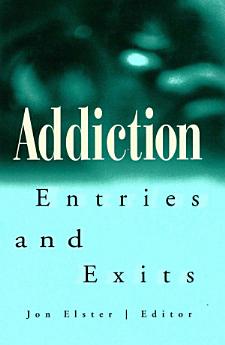Addiction: Entries and Exits
Jon Elster
Eki 1999 · Russell Sage Foundation
E-kitap
332
Sayfa
reportPuanlar ve yorumlar doğrulanmaz Daha Fazla Bilgi
Bu e-kitap hakkında
Addiction focuses on the emergence, nature, and persistence of addictive behavior, as well as the efforts of addicts to overcome their condition. Do addicts act of their own free will, or are they driven by forces beyond their control? Do structured treatment programs offer more hope for recovery? What causes relapses to occur? Recent scholarship has focused attention on the voluntary aspects of addiction, particularly the role played by choice. Addiction draws upon this new research and the investigations of economists, psychiatrists, philosophers, neuropharmacologists, historians, and sociologists to offer an important new approach to our understanding of addictive behavior. The notion that addicts favor present rewards over future gains or penalties echoes throughout the chapters in Addiction. The effect of cultural values and beliefs on addicts, and on those who treat them, is also explored, particularly in chapters by Elster on alcoholism and by Acker on American heroin addicts in the 1920s and 1930s. Essays by Gardner and by Waal and Mørland discuss the neurobiological roots of addiction Among their findings are evidence that addictive drugs also have an important effect on areas of the central nervous system unrelated to euphoria or dysphoria, and that tolerance and withdrawal phenomena vary greatly from drug to drug. The plight of addicts struggling to regain control of their lives receives important consideration in Addiction. Elster, Skog, and O'Donoghue and Rabin look at self-administered therapies ranging from behavioral modifications to cognitive techniques, and discuss conditions under which various treatment strategies work. Drug-based forms of treatment are discussed by Gardner, drawing on work that suggests that parts of the population have low levels of dopamine, inducing a tendency toward sensation-seeking. There are many different explanations for the impulsive, self-destructive behavior that is addiction. By bringing the triple perspective of neurobiology, choice, and culture to bear on the phenomenon, Addiction offers a unique and valuable source of information and debate on a problem of world-wide proportions.
Yazar hakkında
JON ELSTER is Edward L. Ryerson Distinguished Service Professor of Political Science and Philosophy at the University of Chicago. CONTRIBUTORS: Caroline Jean Acker, George Ainslie, Jon Elster, Eliot L. Gardner, Olav Gjelsvik, Jørg Mørland, Ted O'Donoghue, Matthew Rabin, Ole-Jørgen Skog, Helge Waal, and Gary Watson
Bu e-kitaba puan verin
Düşüncelerinizi bizimle paylaşın.
Okuma bilgileri
Akıllı telefonlar ve tabletler
Android ve iPad/iPhone için Google Play Kitaplar uygulamasını yükleyin. Bu uygulama, hesabınızla otomatik olarak senkronize olur ve nerede olursanız olun çevrimiçi veya çevrimdışı olarak okumanıza olanak sağlar.
Dizüstü bilgisayarlar ve masaüstü bilgisayarlar
Bilgisayarınızın web tarayıcısını kullanarak Google Play'de satın alınan sesli kitapları dinleyebilirsiniz.
e-Okuyucular ve diğer cihazlar
Kobo eReader gibi e-mürekkep cihazlarında okumak için dosyayı indirip cihazınıza aktarmanız gerekir. Dosyaları desteklenen e-kitap okuyuculara aktarmak için lütfen ayrıntılı Yardım Merkezi talimatlarını uygulayın.






